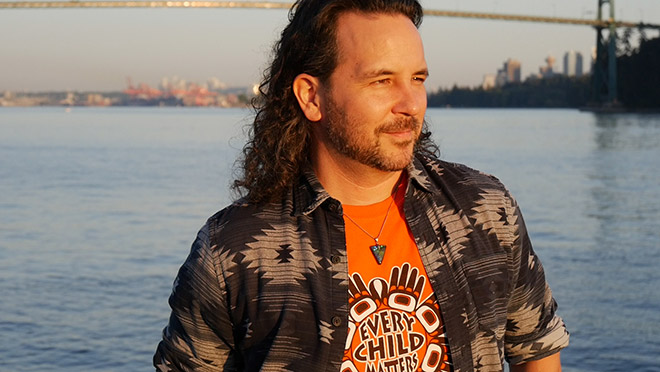Understanding, not guilt, the goal of Orange Shirt Day

Indigenous storyteller sheds light on lasting effects of residential schools
It's gut-wrenching to hear Dallas Yellowfly speak about what happened in his family living room, where he was beaten along with his mother, by a dad haunted and tormented by his days growing up in Canada's residential school system.
"Abuse creates more abuse," says Yellowfly. "You can blame someone for punching someone, but you need to ask 'who made him like that?' A priest beat him up as a child, and that was the only parent he knew for most of the first 14 years of his life."
Yellowfly says he owes it all to his mom for leaving his abusive father, raising him well as a single mother, and preventing him from following in his dad's footsteps. In stark contrast to his dad, Yellowfly went to good schools, first in Chilliwack and then at the University of Fraser Valley. And he's now a much sought after Indigenous storyteller who will be particularly busy around Orange Shirt Day 2020.
Several B.C. companies, including BC Hydro, Coast Capital Savings, RBC, and Telus, have hired Yellowfly to engage employees via an online presentation of his personal story around residential schools. Presenting online isn't ideal – Yellowfly's in-person shows rely on the intimacy of the gathering, along with multimedia elements, to fully engage the audience – but in the days of COVID-19, he's determined to make it work.
"These companies all want their staff to better understand why they might be wearing an orange shirt on that day," he says. "Not everyone's been affected directly by residential schools, but I think our entire country – including every employee at BC Hydro – has been affected indirectly."
Orange Shirt Day is a chance keep alive the discussion of Canada's residential school system, which operated from the 1870s through the closing of the last residential school in 1996. It saw more than 150,000 First Nations, Métis, and Inuit children removed from their families and placed in schools, many forbidden to speak their language and denied their culture.
This year's Orange Shirt Day is set for September 30, a date chosen as most children will be back in school and teachers will be in the position to discuss racism and bullying in the context of an ugly piece of Canadian history.
Living proof that the cycle of abuse can end
Growing up in an abusive home left Yellowfly ashamed of his name and heritage. A member of the Siksika First Nation born and raised on Sto:lo territory, Yellowfly wrestled with his abuse as a child but eventually flourished under his mother's watch and embraced Indigenous culture.
After completing an arts degree in sociology and anthropology at the UFV, Yellowfly dived into the arts, both as a stand-up comic and as a guitar player with a touring rock/metal band. He eventually joined forces with three other storytellers – including two residential school survivors – to form the storytelling collective 3 Crows Productions.
In the years leading up to the coronavirus outbreak, Yellowfly took his multimedia storytelling production "Qwalena: The Wild Woman Who Steals Children", to school gymnasiums, prisons, and board rooms. A dramatic story of a woman who lurks in the forest and snatches children, Qwalena is an allegory for the role of government agents who took Indigenous kids from their homes to place them in Canada's residential school system.
That presentation, often accompanied by first-person storytelling by residential school survivors Cyril Pierre and Joe Ginger, has had a lasting effect on audiences. Yellowfly recalls in particular, one email he received after a corporate presentation.
"The email said 'Dear Dallas, I just want to thank you. I think I was a racist, and in 70 minutes you made me understand how I was wrong,'" he says. "That's the kind of response I want... for a person not expecting to change to think a little differently now."
Yellowfly says he wants no one in his audience to feel guilty. His goal is one of understanding some context around the struggles of many Indigenous people in Canada, including those who represent – according to a recent Correctional Investigator report – a shocking 30% of all people in Canadian prisons.
"This might be the only time some people think about why so many indigenous people are filling the prisons in Canada," he says. "How is it possible that such a small portion of the population represent such a large number within the prison system?
"I like to talk about some of those systemic issues, using storytelling to make it easier for people to digest. But the last thing you want to do is start blaming people for something they had no part of."
Related: